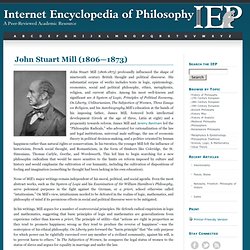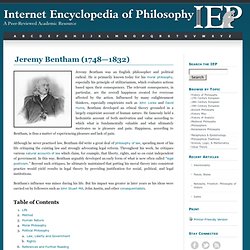

The History of Utilitarianism. 1.

Precursors to the Classical Approach Though the first systematic account of utilitarianism was developed by Jeremy Bentham (1748–1832), the core insight motivating the theory occurred much earlier. That insight is that morally appropriate behavior will not harm others, but instead increase happiness or ‘utility.’ What is distinctive about utilitarianism is its approach in taking that insight and developing an account of moral evaluation and moral direction that expands on it. Early precursors to the Classical Utilitarians include the British Moralists, Cumberland, Shaftesbury, Hutcheson, Gay, and Hume. Mill, John Stuart John Stuart Mill (1806-1873) profoundly influenced the shape of nineteenth century British thought and political discourse.

His substantial corpus of works includes texts in logic, epistemology, economics, social and political philosophy, ethics, metaphysics, religion, and current affairs. Among his most well-known and significant are A System of Logic, Principles of Political Economy, On Liberty, Utilitarianism, The Subjection of Women, Three Essays on Religion, and his Autobiography.Mill’s education at the hands of his imposing father, James Mill, fostered both intellectual development (Greek at the age of three, Latin at eight) and a propensity towards reform. James Mill and Jeremy Bentham led the “Philosophic Radicals,” who advocated for rationalization of the law and legal institutions, universal male suffrage, the use of economic theory in political decision-making, and a politics oriented by human happiness rather than natural rights or conservatism.
Table of Contents 1. Bentham, Jeremy Jeremy Bentham was an English philosopher and political radical.

He is primarily known today for his moral philosophy, especially his principle of utilitarianism, which evaluates actions based upon their consequences. The relevant consequences, in particular, are the overall happiness created for everyone affected by the action. Influenced by many enlightenment thinkers, especially empiricists such as John Locke and David Hume, Bentham developed an ethical theory grounded in a largely empiricist account of human nature.
Philosophy Bites.